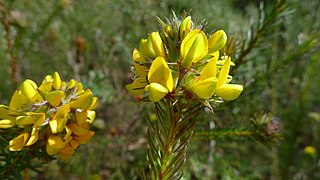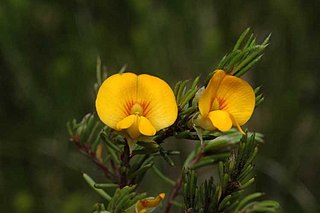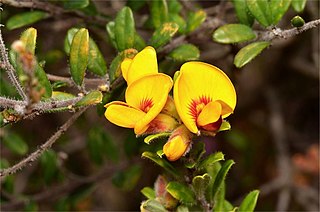
Pultenaea flexilis known as the graceful bush-pea, is a species of flowering plant in the family Fabaceae and is endemic to eastern Australia. It is an erect shrub with linear to narrow egg-shaped leaves with the narrower end towards the base, and yellow to orange flowers with red markings.

Pultenaea stipularis, commonly known as handsome bush-pea, is a species of flowering plant in the family Fabaceae and is endemic to New South Wales. It is an erect shrub with glabrous stems, linear to narrow elliptic leaves, and yellow to orange flowers, sometimes with red markings.
Pultenaea alea is a species of flowering plant in the family Fabaceae and is endemic to New South Wales. It is an erect shrub with linear leaves and pea-like flowers arranged near the ends of branchlets.

Pultenaea altissima, commonly known as tall bush-pea, is a species of flowering plant in the family Fabaceae and is endemic to south-eastern continental Australia. It is an erect shrub with spatula-shaped to egg-shaped leaves and yellow flowers in clusters at the ends of branches.

Pultenaea aristata, commonly known as bearded bush-pea or prickly bush-pea, is a species of flowering plant in the family Fabaceae and is endemic to New South Wales. It is a small, erect shrub with linear to narrow elliptic, sharp-tipped leaves, and yellow and red flowers.

Pultenaea capitellata, commonly known as hard-head bush-pea, is a species of flowering plant in the family Fabaceae and is endemic to south-eastern continental Australia. It is a sprawling to prostrate shrub with elliptic to broadly egg-shaped leaves, and yellow to orange flowers with a red to purple keel.

Pultenaea echinula, commonly known as curved bush-pea, is a species of flowering plant in the family Fabaceae and is endemic to a small area of New South Wales. It is an erect shrub with linear, needle-shaped, grooved leaves, and dense clusters of yellow to orange and red flowers.
Pultenaea elusa, commonly known as elusive bush-pea, is a species of flowering plant in the family Fabaceae and is endemic to a small area of New South Wales. It is a low shrub with sharply-pointed linear leaves, and dense clusters of yellow to orange and red to purple flowers. It has not been seen since 1938.

Pultenaea fasciculata, commonly known as alpine bush-pea or bundled bush-pea is a species of flowering plant in the family Fabaceae and is endemic to south-eastern Australia. It is a small prostrate or low-lying shrub with cylindrical leaves and yellow to orange-coloured flowers arranged singly or in small groups near the ends of branchlets.

Pultenaea foliolosa, commonly known as the small-leaf bush-pea, is a species of flowering plant in the family Fabaceae and is endemic to eastern Australia. It is an erect to low-lying shrub with elliptic to oblong leaves that are concave on the upper surface, and yellow to orange and reddish-brown flowers.

Pultenaea glabra, commonly known as smooth bush-pea, is a species of flowering plant in the family Fabaceae and is endemic to eastern New South Wales. It is an erect shrub with glabrous stems, linear to egg-shaped leaves with a concave upper surface, and yellow to red and orange flowers.

Pultenaea maritima, commonly known as coastal bush-pea or coastal headland pea, is a species of flowering plant in the family Fabaceae and is endemic to eastern Australia. It is a prostrate, mat-forming shrub with elliptic, or oblong to spatula-shaped leaves and pea-like flowers.

Pultenaea parviflora, sommonly known as Sydney bush-pea, is a species of flowering plant in the family Fabaceae and is endemic to eastern New South Wales. It is usually a small, erect shrub with wedge-shaped to narrow egg-shaped leaves with the narrower end towards the base, and clusters of yellow to orange and red flowers.

Pultenaea petiolaris, commonly known as woolly bush-pea, is a species of flowering plant in the family Fabaceae and is endemic to eastern Australia. It is a low-lying shrub with linear leaves, pea-like flowers and flattened fruit.
Pultenaea rodwayi is a species of flowering plant in the family Fabaceae and is endemic to south-eastern New South Wales. It is an erect shrub with hairy branchlets, linear leaves, and yellow to orange and red, pea-like flowers.

Pultenaea tarik is a species of flowering plant in the family Fabaceae and is endemic to the Gibraltar Range National Park in New South Wales. It is an erect shrub with hairy, arching branchlets, elliptic to egg-shaped leaves with the narrower end towards the base, and yellow to orange and red to purple, pea-like flowers.
Pultenaea tenella, commonly known as delicate bush-pea, is a species of flowering plant in the family Fabaceae and is endemic to the high country near the border between New South Wales and Victoria in south-eastern continental Australia. It is a small, prostrate, mat-forming shrub with elliptic to linear leaves and yellow to orange and red, pea-like flowers.
Pultenaea villifera is a species of flowering plant in the family Fabaceae and is endemic to two disjunct areas of Australia. It is an erect to prostrate shrub with triangular to linear, egg-shaped to elliptic leaves and yellow and red, pea-like flowers.

Pultenaea viscidula, commonly known as dark bush-pea, is a species of flowering plant in the family Fabaceae and is endemic to South Australia. It is an erect shrub with branches that are sticky when young, linear to cylindrical, channelled leaves with stipules at the base, and yellow to orange and yellow-red to green flowers.

Pultenaea vrolandii, commonly known as cupped bush-pea, is a species of flowering plant in the family Fabaceae and is endemic to south-eastern continental Australia. It is an erect shrub with hairy, arching branchlets, elliptic to egg-shaped leaves, and yellow to orange and red to brown flowers.
















